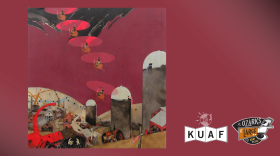SCOTT SIMON, HOST:
Sarah Ruhl, the playwright, knows how to script a great entrance. She begins her new memoir by saying, 10 years ago, my smile walked off my face and wandered out in the world. She shares the story of suffering a sudden paralysis of her face just after giving birth to twins and, of somewhat less importance, having her first play on Broadway. Her book is a meditation on chance, illness, expectation, parenthood, appearance and two elemental reflexes most of us probably don't think much about - smiling and blinking. Her book - "Smile: The Story Of A Face."
Sarah Ruhl joins us from New York. Thanks so much for being with us.
SARAH RUHL: It is such a pleasure.
SIMON: Quite a phrase you have early on when you talk about all of this beginning to happen. And you looked into the mirror. I wrote down your words. You wrote, puppet face, string cut. What happened?
RUHL: Well, I had just given birth to twins. And it was a high-risk pregnancy. And the lactation consultant, I remember, was in the corner. And she looked at me and said, your eye looks a little droopy. And I said, oh, well, I'm Irish (laughter), you know, thinking of how when we all drink our eyes get a little droopy. And she said, no, that's not what I'm talking about. Look in the mirror. And I looked. And, indeed, this whole side of my face, the left side, was just completely fallen down. So I thought, either I've had a stroke or this is Bell's palsy. And, indeed, it was Bell's palsy.
SIMON: And we should underscore - this was a revelation to me - it's not just paralysis. It's other stuff - sensitivity to noises, pain.
RUHL: Yeah. The acute onset - you get a really bad headache. What usually muffles your ear is not muffled because of the cranial nerve. So if there are loud noises - in my case, babies crying loudly - it's a kind of torture at first.
SIMON: What was it like to look in the mirror? Could you look in the mirror?
RUHL: It was really hard. And to be honest with you, I avoided looking in the mirror for probably a decade. I did get better over time. But I was on a very slow boat to recovery.
SIMON: You - as you note in this memoir, two delightful infants. How difficult is it not to be able to smile at your children?
RUHL: It was kind of excruciating. I so much wanted to communicate my joy and my love to them. And so I was worried that I was supposed to teach them empathy and teach them joy, but I couldn't do it with half my face. And my husband would say, no, no. Don't worry. They see your intent to smile. But I was worried about it until about two years ago. I was looking through old videos of that time because I never allowed myself to be photographed. I was always on the other side of the camera. And I was taking a video of the twins, and I realized that the smile was in my voice all along.
SIMON: Well, help us understand what you went through with various physicians, doctors and scientists. I mean, I made a note. You tried acupuncture, chiropractic, nerve treatments, physical therapy. You considered neurosurgery. You had - I speak from some experience - EMG nerve tests. What was it like to go through and get so many different opinions?
RUHL: It was like a pilgrim's progress moving from the slough of despond into the - I don't know - celestial city that is Brooklyn where I live now. But it was hard. And I encountered some amazing doctors who truly listened to narrative, which I think, ultimately, really helped me get a diagnosis of celiac disease, which was probably inhibiting my healing because I wasn't absorbing all my vitamins. And then I saw some terrible doctors who made me feel ashamed, made me feel my face was somehow my fault. So we really ran the gamut.
SIMON: And we should explain celiac disease.
RUHL: Yeah. So celiac disease is an autoimmune disease. It's not really a food allergy. It's when your stomach attacks itself when you have gluten and recognizes it as a foreign substance. So the danger with celiac disease is that you can become five more times as likely to develop certain kinds of cancer, which, unfortunately, was the case with my father.
SIMON: After your experience, which, you know, to agree is ongoing now, how wise or kind is it to infer anything about a person from their face?
RUHL: That's such a beautiful question because in a way, the face is our canvas. The eyes are the windows to the soul. I do believe that. And now we have our masks on, and we look at the eyes. And we have access to people's thoughts and feelings through their eyes. For those of us with asymmetries, I guess it's my hope to make it a little more comfortable in a world that insists on symmetry, you know, to divorce the meeting of minds through faces from a kind of objectification of a face.
SIMON: You know how we love old Broadway songs? I do, at any rate. Let's cue the music, please, of a song that's become more resonant to you - the Rosie Clooney version.
(SOUNDBITE OF SONG, "I'VE GROWN ACCUSTOMED TO YOUR FACE")
ROSEMARY CLOONEY: (Singing) I've grown accustomed to your face. You almost make the day begin. I've grown accustomed...
SIMON: This song reappeared in your life at just the right time, I gather. What did it make you think about?
RUHL: Well, I was going to Lincoln Center, which is where I had my first Broadway production of "The Vibrator Play." And Laura Benanti happened to be in that production. And she was in "My Fair Lady" at the Beaumont. So I was going and visiting her. And "I've Grown Accustomed To Her Face" is in "My Fair Lady," of course. And I just was so moved by it and thinking about growing accustomed to my own face, having my husband be accustomed to my face, the evolution of love through the face, both for your beloved and for the self. And I thought, what a great song (laughter).
SIMON: Yeah.
RUHL: Thanks for playing it.
SIMON: So you look at your face today?
RUHL: I don't mind so much anymore. I mean, I can endure Zoom calls, for one thing, which at the beginning would've been very hard for me. I learned to prize the function of the muscles over vanity. What the face can do, how it can communicate friendliness or joy - what a gift that is.
SIMON: Sarah Ruhl, the eminent playwright. Her book - "Smile: The Story Of A Face." Thank you so much for being with us.
RUHL: Thank you so much for having me. Transcript provided by NPR, Copyright NPR.





